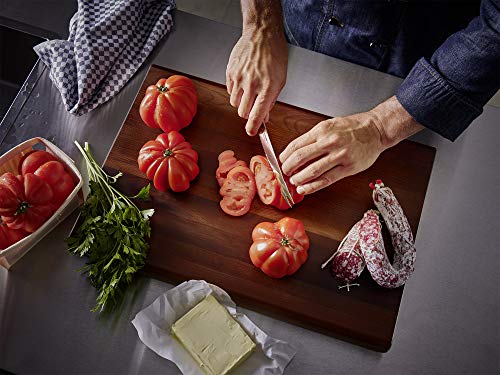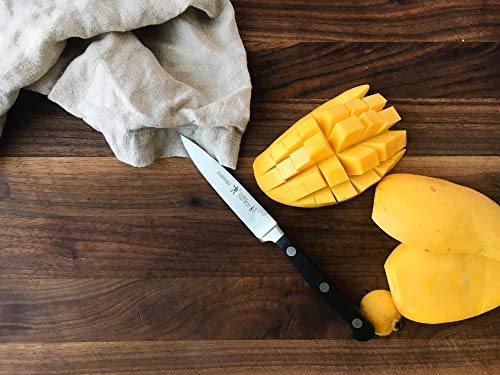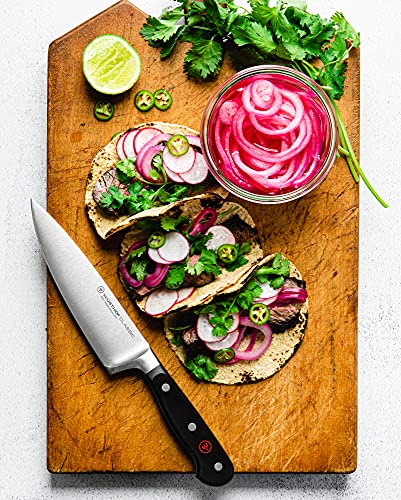Germany has long been a world knife manufacturing giant, and this review of Wusthof vs Henckels will show you why. Two of the best brands of German knives on the planet, you’ll find these blades in the hands of some of the world’s best gourmet chefs.
At the end of the article, you’ll see Wusthof and Henckels as more than just German-style knives. They are accomplished, award-winning companies that stand the test of time.
What is Wusthof?
A brand that has far outlasted the human lifespan, Wusthof has been around for over 200 years making knives! Founded in the 1800s in a town known as Solingen, their origins are rooted in the German ‘city of blades,’ famous for its elite bladesmiths.
Wusthof makes every forged knife with a 40-step process that incorporates the effort of skilled craftspeople with precision technology. It makes for a finish high in sharpness, edge retention, and durability.
What is Henckels?
Henckels is the entry-level brand of Zwilling J.A. Henckels, established over two centuries ago. Zwilling designs its knives to offer a premium range of German-style forged knife blades.
On the other hand, Henckels knives are mostly made as stamped knives with minimum forged knife options, making them more affordable.
How are they made
Wusthof makes its knives using the forging process. This is typically more costly than the stamped process but results in higher performance and durability. Using special German high carbon stainless steel, a large piece is exposed to extremely high temperatures and then molded into shape.
This metal is shaped into the design of a blade as the 40-step process combining the efforts of man and machine commences.
Upon completion, Wusthof sharpens its blades to a razor-sharp edge of 14 degrees per side, a steeper blade angle than most. They are also hardened to a Rockwell Hardness Rating of 58 HRC. It is a good balance between durability and chip resistance.
Wusthof kitchen knives are also available as stamped knives, as seen in their Gourmet collection. These are more affordable than the Wusthof Classic series.
Peter Henckels registered the company Henckels in an attempt to offer more affordable knives to its customers. For that reason, Henckels kitchen knives typically come in the form of stamped blades.
Stamped knives are more affordable to mass produce. The process involves laser cutting a large sheet of steel, which is then bent into shape, heat-treated, and honed for strength and durability.
Henckels stamped knives have a thinner profile than Wusthof’s forged knives. As a result, they are more lightweight but also more susceptible to chips and cracks. In addition, Henckels sharpens its knives to a blade angle of 15 degrees per side, making it sharper than most.
Regarding the Hardness Rating, Henckels knives are built with an HRC score of around 55-57. The narrow blade is slightly less hard than Wusthof’s.
Blade differences
At first glance, you may notice the difference in width or thickness between Wusthof and Henckels knives. This is because Wusthof crafts its knives using the forged knife process. As a result, most of their products come in high-quality rust-resistant steel, built with full tang construction.
Wusthof offers durable German-style knife blades that are less prone to chipping thanks to its high carbon steel content.
In contrast, Henckels offers lower-cost stamped knives that are typically thinner than Wusthof’s forged ones. In addition, the softer steel of Henckels blades has an HRC level of about 55-57, making them less hard than the average Wusthof knife.
Furthermore, stamped knives are not made in full tang like forged knives. Instead, the Henckels simply stamps its blade onto the handle for a more affordable product finish.
Other differences in the blade come down to their sharpness, with Wusthof being the sharper choice of the two. Generally speaking, Wusthof sharpens its knives to 14-degree angles per side, including the famous Wusthof Classic Ikon and all other Wusthof Ikon knives in the range.
On the other hand, Henckels typically sharpen to 15 or 16-degree angles, but both brands offer santoku knives at 10-degree sharpness.
Material differences (blade and handle)
You’ll be pleased to know that both the Wusthof and Henckel brands make their blades with high-carbon stainless steel. They also offer handles made of wood or synthetic materials, allowing the user to choose their comfort level and aesthetic design as preferred.
Henckels and Wusthof both make their knife handles ergonomic and secure. In many cases, these handles are dishwasher-safe, so long as it’s one of the synthetic handles.
You will find both knife companies offer a range of Japanese knives and German knife options. They have their santoku knife range and their chef’s knife range. In terms of the blade dimensions, Henckels knives are typically more narrow and lightweight, offering an easier time when cutting ingredients.
However, the forged knives of Wusthof guarantee penetration through touch ingredients like thick meats without chipping or cracking.
Warranty
When it comes to warranty, you’ll find Henckels knives and Wusthof knives both come with a limited lifetime warranty upon purchase. This means the user is covered for any defects relating to manufacturing or the quality of the material.
As such, you can have your product replaced or repaired at little to no cost.
Neither Wusthof nor Henckel’s offer sharpening services such as the Forever Sharpness Guarantee provided by Cutco. This means you cannot send your knives back for resharpening or maintenance once the edge goes dull.
While that may be the case, you can still purchase various sharpening and honing tools to maintain your knives yourself. This is a feature offered by both Wusthof and Henckels.
Cleaning
Henckels and Wusthof recommend handwashing your kitchen knives to avoid rusting or corrosion. Although it may be true that both Henckels and Wusthof make their blades from high carbon rust-resistant steel, the amount of moisture exposure from dishwashers may trump this.
Furthermore, the dishwasher will compromise those products with Pakkawood handles, as you may experience the handle expanding or chipping away.
To effectively clean your knives, whether a Henckels or a Wusthof knife, you should start by rinsing the blade and handling it in warm water under the sink.
Next, apply a light detergent or soap and use a cloth to scrub the blade clean, ensuring not to make skin contact with the blade’s edge in the process. Lastly, you should use a clean, dry cloth to dry the blade and handle. Make sure to store your knife in a safe space, such as a knife block or a drawer away from children.
How are they different?
The most apparent difference between Wusthof and Henckels is the types of knives each brand offers. Wusthof primarily makes forged knives from a single steel rod, whereas Henckels makes their stamped knives out of a laser-cut metal sheet (1).
As a result, Wusthof knives are typically full tang, meaning the entire blade runs through the handle. On the other hand, Henckels’ stamped blade is attached to the handle as a separate entity.
Generally speaking, Henckels knives are thinner and more lightweight than Wusthof’s knives, which is true for most of their product offerings.
In addition, the knife edges of Wusthof are thicker and stronger than Henckels, making them less prone to chipping and cracking. However, Wusthof knives are also harder than Henckels, scoring a Hardness Rockwell Scale score of 58 on average, compared to Henckels which ranges from 55 to 57.
Other notable differences include the sharpness of each brand, with the typical Wusthof kitchen knife coming in at an extra sharp edge of 14 degrees per side. Contrastingly, Henckels sharpens each knife to a 15-degree blade angle per side, making it sharper than most knives but not quite at Wusthof’s level.
Both brands differ significantly in pricing. The premium Wusthof line is set at several price points higher than Henckels stamped blades.
How are they similar?
Despite their vast differences in some areas, Wusthof and Henckels remain largely similar on an overall outlook. Both brands are born in the city of blades, Solingen, Germany, where they have access to the best steel manufacturers in the country. Also, both Wusthof and Henckels offer forged and stamped blades in their collections, providing a wide array of product offerings to suit a larger customer base.
Other similarities include having both been in the kitchen knife industry for over 200 years. Furthermore, Wusthof and Henckels offer similar knife lines that typically come with chef’s, utility, paring, and bread knives.
Both Henckels and Wusthof also come with a limited lifetime warranty. This covers their customers for any manufacturing or material defects experienced with their product.
What’s better about Wusthof?
Ultimately, Wusthof is the higher-end brand with a greater quality assured due to its superiority in craftsmanship. The brand has been around for over 200 years, and they are unbeatable in performance, edge retention, and sharpness.
Wusthof also has some of the most aesthetically pleasing knives on the market, and their iconic logo can be seen on hit cooking shows like Gordon Ramsay’s Hell’s Kitchen (2).
Since Henckels is a more affordable brand, they compromise on quality and are hence not quite as high performing as Wusthof. Most of Wusthof’s products include forged knives high in edge retention and extra sharp to 14 degrees per side. They are also harder than Henckels knives with a HRC score of 58 compared to Henckels 55-57 HRC.
What’s better about Henckels?
Henckels is the more affordable brand of the Zwilling J.A. Henckels line. So, while their knives aren’t quite at the level of quality as the Zwilling Professional series, they do have plenty to offer.
The advantage of stamped blades is that they are cheaper to make and, hence, cheaper to buy. Henckel knives are also thinner and more lightweight, making them easier to use for many customers.
The great thing about Henckels is that they offer a range of forged knives as well, and these items are generally more affordable than Wusthof too.
For example, the J.A. Henckels International Forged Premio 8-inch Chef Knife is quite similar to the Wusthof Ikon knife and delivers similar results. Almost identical in appearance, this knife comes with a pinky finger lock for safety, triple rivets, and a full tang forged construction, all at a reasonable price!
Who should get Wusthof and why?
There’s no way around it; you have to be willing to spend a bit extra for a Wusthof knife than other knife brands. While they offer a series of more affordable stamped blades, I would advise going for the forged chef’s knife if you choose Wusthof.
This is because the brand specializes in crafting forged blades in a full tang construction. So, unless it’s absolutely out of your budget, consider Wusthof’s forged knives.
Who should get Henckels and why?
Henckels is the brand that budget buyers and bargain seekers are looking for. As the child brand of Zwilling, Henckels promises quality at a reasonable price, albeit a major reason for this is due to the stamped design of their blades.
In addition, since they stamp their knives, Henckels can price their products significantly lower than Wusthof. This makes them more appealing and just as good in performance for the everyday home cook.
Features
Blade
While both Henckels and Wusthof use high-carbon stainless steel made from the best German metals, they craft their knives differently. Wusthof uses a 40-step crafting process that incorporates the combined efforts of handypersons and computers.
This process has been perfected over 200 years and the forged blades produced are hardened to 58 HRC and sharpened to 14 degrees per side.
On the other hand, Henckels mostly makes its knives using the stamped method. A metal sheet is laser cut, heat-treated, and attached to the handle. Since they are not full tang built, and also not forged, Henckels knives are more susceptible to chipping and cracking under pressure.
They are also not as sharp or as hard as Wusthof knives, making Wusthof the superior choice in terms of the blade.
Winner: Wusthof
Handle
Both Wusthof and Henckels offer wooden and synthetic handles for their knives, with a variety large enough to suit many different hands. Wusthof Classic Ikon shares a similar design to most of Henckels knives, with a distinct curve at the bottom.
However, you’ll find a greater range of handle options with Wusthof than Henckels. Designs include rounded bottoms, curved architecture, and logo-engraved handles.
Winner: Wusthof
Price & Warranty
Wusthof and Henckels offer limited lifetime warranties with their products, covering the user for any manufacturing or material quality defects. When it comes to price, however, Henckels is the clear winner with a company mission to make quality knives more affordable.
As a result, you’ll typically find a Henckels equivalent of a Wusthof knife at half, if not less than half of the price.
Winner: Henckels
Wusthof vs Henckels FAQ
Is JA Henckels the same as Wusthof?
No, JA Henckels is a German brand of kitchen knives that produces affordable stamped and forged knives at reasonable prices. Wusthof is a high-end brand of German knives that Michelin-star chefs worldwide promote.
Is Zwilling the same as Wusthof?
No, Zwilling and Wusthof are manufactured in the same town of Solingen, Germany, but are completely separate brands. With that said, they do have many similarities from their origins to their product offerings and quality.
Which knife brand is best?
The German powerhouse Wusthof is one of the best brands for a high-quality chef’s knife. Their knives are made using a 40-step crafting process using highly skilled craftsman and precise technology, and their knives are used by global Michelin-star chefs such as Gordon Ramsay.
Sources
(1) – https://www.sciencedirect.com/topics/materials-science/laser-cutting
(2) – https://www.imdb.com/title/tt0437005/


















